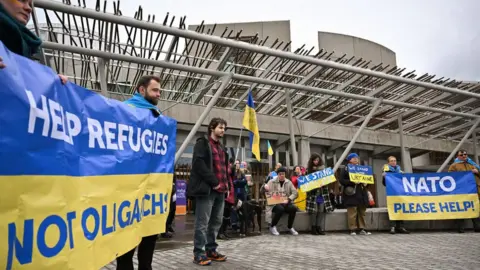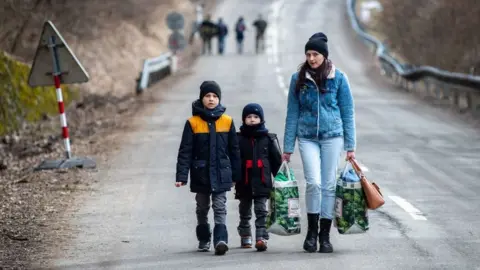Hundreds of Ukrainian refugees stuck in Scottish hotels
 Getty Images
Getty ImagesAbout 500 Ukrainians are still living in hotels a month after arriving in Scotland, MSPs have heard.
Yevhen Mankovskyi, the Ukrainian consul general in Edinburgh, said he did not understand what was causing a "block" to stop those arriving in Scotland being matched with hosts.
He asked if Scottish government staff could visit those still in hotels.
The consul general said he understands Edinburgh is "full" and Ukrainians are being moved elsewhere in Scotland.
He told Holyrood's Europe committee: "Approximately 500 people throughout Scotland live in hotels for more than one month. Unfortunately, we don't have direct numbers.
"We don't understand where is the problem of matching the host family and Ukrainians who are already here."
Mr Mankovskyi said he did not consider those arriving in Scotland to be refugees, but instead Ukrainians who have received "temporary protection status" who will one day return home.
 Getty Images
Getty ImagesNeil Gray, the Scottish government minister with special responsibility for Ukrainian refugees, also appeared before the committee.
He said: "I don't want to see people in hotel rooms for any longer than is absolutely necessary.
"We're working with local authorities to build capacity with the matching service."
The minister vowed to leave "no stone unturned" in making sure the matching service was working as quickly as possible.
He added that he had recently visited a refugee centre in Poland - where many Ukrainians have fled - and that this had made him more determined to help.
He said: "People there are doing their best. But seeing the difficult situation has given me even greater determination to do all we can."
What is the super sponsor scheme?
After Russia invaded Ukraine, the UK government announced its Homes for Ukraine scheme - which allowed members of the public to host refugees.
Initially, the UK scheme was only open to applicants who knew a named individual from Ukraine who they wanted to help.
But it was expanded to allow Ukrainians to name the Scottish government as their sponsor - meaning the government would be responsible for setting them up with a place to stay as well as education and childcare.
Temporary accommodation - including in hotels - was to be used until a longer-term place with a host could be found.
A similar scheme was set up by the Welsh government.
 AFP/Getty Images
AFP/Getty ImagesCharities, community groups and churches could also match refugees with hosts.
The Scottish government's initiative was supposed to bypass the need to match hosts with refugees before arrival.
Scots can still sign up to offer accommodation through the UK government.
Details are then shared with the Scottish government who can arrange appropriate longer-term matches.
Ukrainians can also come to Scotland using two other routes: the family visa and the individual sponsor route.
How many Ukrainians are in Scotland on the super sponsor scheme?
The Ukrainian consulate in Edinburgh estimates that about 500 refugees are still staying in hotels, a month after arriving in Scotland.
According to UK government figures, by 14 June a total of 2,631 people had arrived in the UK sponsored by the Scottish government.
The Scottish government had issued more than three times as many visas as that - 8,647 out of 10,066 applications received.
And 3,796 people had applied and cited an individual from Scotland on their application form.
Most of these - 3,425 - had been issued with visas, and 2,142 of them had arrived in the UK.

War in Ukraine: More coverage

